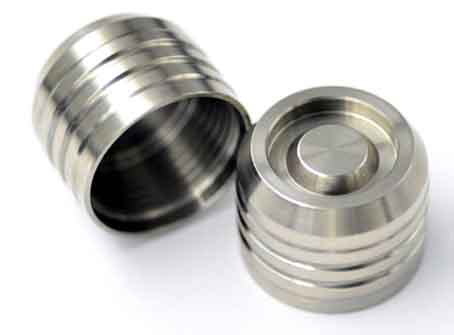I færd med CNC-drejning og fræsning af titanlegering, de forhold, der skal være opmærksomme på, er:
(1) På grund af det lille elasticitetsmodul af titanlegering, spændingsdeformationen og kraftdeformationen af emnet under bearbejdning er store, hvilket vil reducere bearbejdningsnøjagtigheden af emnet; Spændekraften bør ikke være for stor, når emnet er installeret, og hjælpestøtte kan tilføjes, når det er nødvendigt.
(2) If a cutting fluid containing chlorine is used, it will decompose and release hydrogen at high temperatures during machining, which will be absorbed by titanium and cause hydrogen embrittlement;
It may also cause high temperature stress corrosion cracking of titanium alloys.
(3) The chloride in the cutting fluid may also decompose or volatilize toxic gases when used. Safety protection measures should be taken during processing and use, otherwise it should not be used;
After cutting, clean the parts thoroughly with a chlorine-free cleaning agent in time to remove chlorine residues.
(4) It is forbidden to use lead or zinc-based alloy tools and fixtures to contact titanium alloys, and copper, tin, cadmium and their alloys are also forbidden to use.
(5) All tools, fixtures or other devices in contact with titanium alloys must be clean; The cleaned titanium alloy parts should be prevented from being contaminated by grease or fingerprints, otherwise it may cause salt (sodium chloride) stress corrosion in the future.
(6) Under normale omstændigheder, there is no risk of ignition when CNC cutting titanium alloys. Only in the micro-cutting, the cut small chips will ignite and burn. In order to avoid fire, in addition to pouring a large amount of cutting fluid, it is also necessary to prevent the accumulation of chips on the machine tool. Replace the tool immediately after it is blunt, or reduce the cutting speed, and increase the feed rate to increase the chip thickness. In case of fire, fire extinguishing equipment such as talcum powder, limestone powder, dry sand, etc. should be used to extinguish the fire. It is strictly forbidden to use carbon tetrachloride and carbon dioxide fire extinguishers, nor to water, because water can accelerate the combustion and even cause hydrogen explosion.

Forholdsregler for bearbejdning af titanium
 English
English العربية
العربية 中文(漢字)
中文(漢字) Čeština
Čeština Dansk
Dansk Nederlands
Nederlands Suomi
Suomi Français
Français Deutsch
Deutsch Italiano
Italiano 日本語
日本語 ಕನ್ನಡ
ಕನ್ನಡ 한국어
한국어 Português
Português Русский
Русский Slovenčina
Slovenčina Español
Español Svenska
Svenska Türkçe
Türkçe

